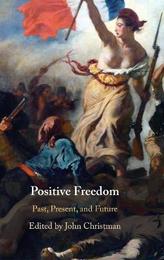
|
Positive Freedom: Past, Present, and Future
Hardback
Main Details
| Title |
Positive Freedom: Past, Present, and Future
|
| Authors and Contributors |
Edited by John Christman
|
| Physical Properties |
| Format:Hardback | | Pages:300 | | Dimensions(mm): Height 235,Width 158 |
|
| Category/Genre | Social and political philosophy |
|---|
| ISBN/Barcode |
9781108487900
|
| Classifications | Dewey:320.011 |
|---|
| Audience | | Professional & Vocational | |
|---|
| Illustrations |
Worked examples or Exercises
|
|
Publishing Details |
| Publisher |
Cambridge University Press
|
| Imprint |
Cambridge University Press
|
| Publication Date |
16 September 2021 |
| Publication Country |
United Kingdom
|
Description
Freedom is widely regarded as a basic social and political value that is deeply connected to the ideals of democracy, equality, liberation, and social recognition. Many insist that freedom must include conditions that go beyond simple "negative" liberty understood as the absence of constraints; only if freedom includes other conditions such as the capability to act, mental and physical control of oneself, and social recognition by others will it deserve its place in the pantheon of basic social values. Positive Freedom is the first volume to examine the idea of positive liberty in detail and from multiple perspectives. With contributions from leading scholars in ethics and political theory, this collection includes both historical studies of the idea of positive freedom and discussions of its connection to important contemporary issues in social and political philosophy.
Author Biography
John Christman is Professor of Philosophy, Political Science, and Women's Studies at Pennsylvania State University. He is author of The Politics of Persons (Cambridge, 2009) and Social and Political Philosophy: A Contemporary Introduction (2002, 2017), and editor of Contemporary Debates in Political Philosophy (with Thomas Christiano, 2009), among other works in social and political philosophy.
Reviews'This is a very rich volume exploring the notion of 'positive freedom' from a variety of angles: historical, conceptual, normative, and related to applied debates. Highly recommended to any reader who wants to know what thinking about 'positive freedom' has to offer us.' Ingrid Robeyns, Utrecht University
|